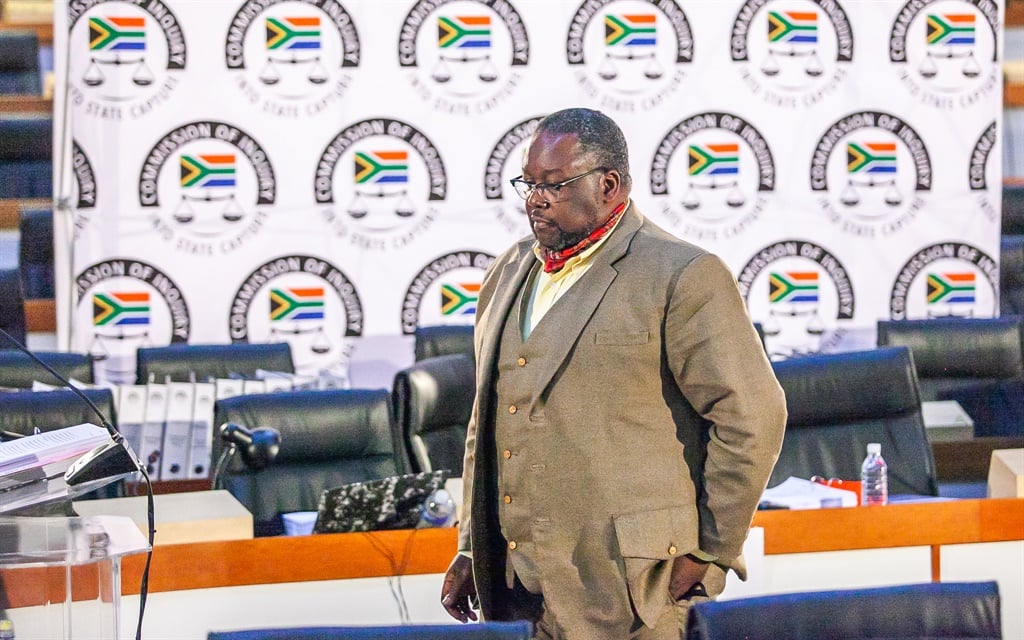


Former police minister Nathi Nhleko at the state capture commission.
Sharon Seretlo, Gallo Images
- Former minister of police Nathi Nhleko acted on the recommendations of a reference group he assembled to look into the matter.
- Upon finding out that there were two contradictory IPID reports into the rendition matter, Nhleko did not seek clarification from then IPID boss Robert McBride.
- Instead, he commissioned a law firm to investigate the reports.
Former minister of police Nathi Nhleko did not seek clarification from the Independent Police Investigative Directorate (IPID) on why there were two contradictory reports into the now infamous Zimbabwe rendition saga.
Instead, he relied on an assessment by a reference group that he assembled to look into the matter and acted on their recommendations that former Gauteng Hawks boss Shadrack Sibiya and former Hawks boss Anwa Dramat be suspended for their role in the renditions.
This was revealed at the commission of inquiry into state capture on Monday, where Nhleko was testifying after being implicated in wrongdoing by several people, including former IPID boss Robert McBride.
READ | Incorrect report used to suspend former Hawks head Anwa Dramat – state capture inquiry hears
Much of the afternoon was focused on the two IPID reports into the so-called illegal rendition of five Zimbabweans between November 2010 and January 2011.
The first report – dated 22 January 2014 – by directorate investigator Innocent Khuba found that Sibiya and Dramat had been involved in the renditions and should be criminally charged.
The second report dated 18 March 2014 found that evidence related to Sibiya and Dramat found no element of crime committed relating to the rendition case.
McBride previously testified that the first report was a preliminary report and further evidence had cleared the Hawks bosses of involvement in the renditions. He further testified that the wrong report was used to suspend Dramat.
When Nhleko took office as the police minister in May 2014, he put together a reference group that were tasked with looking at burning issues within the police ministry. One of these issues was the rendition saga.
Nhleko testified on Monday that the reference group produced an assessment report on the renditions after investigating the matter. He added that the report spoke about the two conflicting IPID reports.
READ | State capture: McBride, former police minister butted heads over contradictory Zimbabwe rendition reports
He later recanted, saying that the reference group had verbally told him about the two reports, but that this was not in their assessment report.
No recollection
The assessment report by the reference group allegedly contained the first IPID report and a Crime Intelligence report, as well interviews they had conducted.
Nhleko said he had no reason to doubt the work of the reference group and that, when they produced the assessment report into the renditions, he had acted on the report’s recommendations.
The former police minister was questioned about IPID’s two reports and when had he received the second report, but said he had no recollection of when or how he had received it, but that he had read both reports.
Deputy Chief Justice Raymond Zondo asked Nhleko if he hadn’t reached out to McBride for an explanation after reading both reports. Nhleko said he could not recall if he had asked for a meeting.
Zondo further asked why Nhleko would did not seek clarity on the matter from McBride who reported to him, adding that IPID’s explanation may have made it unnecessary to investigate further.
READ | IPID investigator told to ‘falsely implicate’ McBride, Zondo commission hears
Nhleko responded by telling Zondo that perhaps that was another way of looking at it, but that in his opinion, he had to constitute a body to look into these issues because the issues were in the public domain at that point.
The body that Nhleko was speaking about was Werksmans, a private law firm, which he hired to probe the two IPID reports.
News24 previously reported that the Werksmans report was then used to institute criminal charges against McBride and two other investigators in the rendition case.
“I really needed assistance in unpacking that particular issue and for that reason, I commissioned further work,” Nhleko told the commission.

